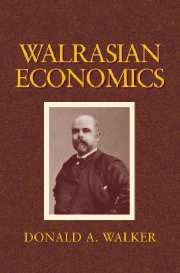Book contents
- Frontmatter
- Contents
- Preface
- Introduction
- Part I Walras's ideas
- 1 General philosophy and methodology
- 2 Economic philosophy and methodology
- 3 Methods of evaluation of economic theory
- 4 Human nature
- 5 Basic sub-models
- 6 Rationale for the written pledges sketch and its characteristics
- 7 Some bibliographical remarks
- 8 The definitive bibliography of the writings of Léon Walras
- Part II Walras's influence
- References
- References and Bibliography for Chapter 11
- Index
3 - Methods of evaluation of economic theory
Published online by Cambridge University Press: 02 September 2009
- Frontmatter
- Contents
- Preface
- Introduction
- Part I Walras's ideas
- 1 General philosophy and methodology
- 2 Economic philosophy and methodology
- 3 Methods of evaluation of economic theory
- 4 Human nature
- 5 Basic sub-models
- 6 Rationale for the written pledges sketch and its characteristics
- 7 Some bibliographical remarks
- 8 The definitive bibliography of the writings of Léon Walras
- Part II Walras's influence
- References
- References and Bibliography for Chapter 11
- Index
Summary
The sixth step: Criteria for evaluations
In Chapter 2 it was shown that Walras was guided by his philosophical and methodological views about economic theorizing in the steps that shaped the development of his mature comprehensive economic model. His sixth step was to develop the criteria he believed were valid for judging the results of the preceding steps in his system of thought and for judging the work of other economists, and to make those judgments.
Walras contended that all economic models (once it is established that they are logical) should be judged by comparing their assumptions, structure, contents, and conclusions with the real economy. He declared, therefore, that his own model should be evaluated by comparing it with the reality from which he abstracted it. His statements cited in Chapter 2 to the effect that his mature model of general equilibrium is in conformity with reality are such comparisons. His belief in the necessity of evaluating theoretical work and the criteria that he believed should be used to make the judgments were consequences of his intellectual orientation, part of his organized philosophical and methodological system.
Theorizing and reality
There is an interesting passage in the Eléments (quoted in Chapter 1) in which Walras declares that theory should find real types in the real world, base ideal types upon them, and then build the structure of scientific reasoning on the latter, to which he adds the remark, “not returning to reality until the science has been constructed and doing so in order to make applications.
- Type
- Chapter
- Information
- Walrasian Economics , pp. 85 - 112Publisher: Cambridge University PressPrint publication year: 2006



